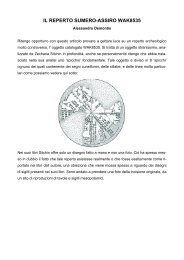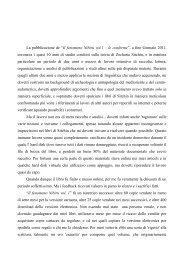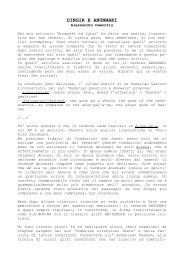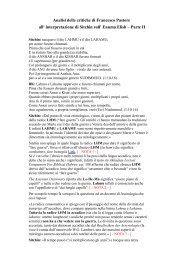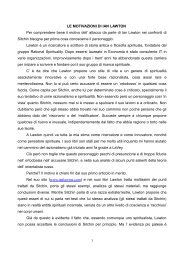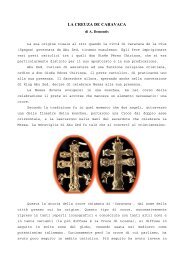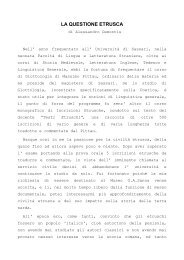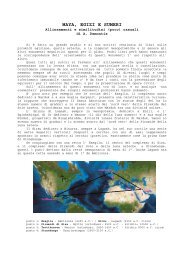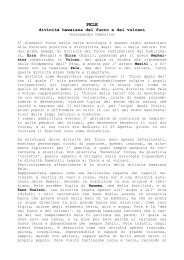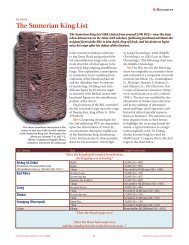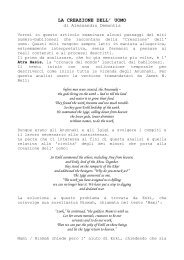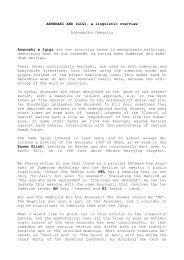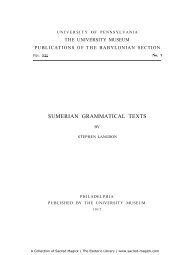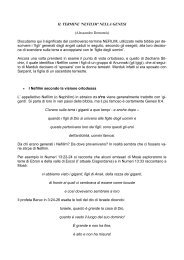Elementary Sumerian Glossary
Elementary Sumerian Glossary
Elementary Sumerian Glossary
Create successful ePaper yourself
Turn your PDF publications into a flip-book with our unique Google optimized e-Paper software.
á - dúb to flap the wings; periphrastic: á-dúb - a5<br />
á - è to rear, bring up, take care of<br />
á-gú-zi-ga early morning, dawn<br />
á-gùb-bu left arm, side; to the left, on the left<br />
á-ĝál mighty, powerful, strong (cf. á-nun-ĝál)<br />
á - ĝar to apply force, overpower<br />
á-ĝi6-ba(-a) at midnight<br />
á-ki-ti (a festival and the temple where it takes place)<br />
á - kúš to tire (the arms) (Attinger, ZA 87, 112)<br />
á-kúš(-ù) adj. tired; n. tiredness; work, labor, toil; ppl.<br />
á-nu-kúš untiring<br />
á - lá to tie the hands, fetter<br />
kuš á-lá (a kind of drum)<br />
á-mè(-k) arm of battle (describing a weapon, poetic)<br />
á-nun(-ĝál) having great power, (most) powerful (cf.<br />
á-ĝál)<br />
á-nam-ur-saĝ heroic arm/strength/weapon (poetic)<br />
á-sàg (a demon); (a source of sickness or death) (><br />
asakku)<br />
(kuš) á-si (leather) strap; urudu á-si copper hinge (Van de<br />
Mieroop, Crafts 134; Civil, Iraq 23, 162)<br />
á-sìg slingstone<br />
á - sù(dr) to extend the arm(s), spread the wings; to<br />
proceed, march on; to sail<br />
á-še now (anumma)<br />
á-ŠE mušen swan(?) (Landsberger, MSL 8/2 130)<br />
á-šita4(U.KID)(-a) paraphanelia, implements (Civil,<br />
JAOS 88 (1968) 7)<br />
á-šu-ĝìr limbs (lit. "arms, hands, and feet")<br />
á - tuku to have strength, power<br />
á-tuku powerful, strong, able-bodied<br />
á-u4-te-na (at) twilight, (in the) evening (coolness)<br />
á-u4-zal-le daybreak, morning<br />
á-zi-da right arm, side<br />
á-zi(g) high-handed action, violence<br />
á-zi-šè by a violent act, by force<br />
a5(k), ak to do, perform, exercise, act (often as an<br />
auxiliary verb); to make, construct; to make like, make<br />
into. Certain contexts require rdg. aka or kè. It can be<br />
combined with a pronoun in forms such as hé-na, ì-na,<br />
see AV Wilcke 226. For rdg. ša5 perhaps = ša4 = the<br />
aux. verb *za see Cavigneaux, ASJ 9, 49ff.; Urnamma<br />
Hymn B 52 has an Ur III (?) var. ša-ša for OB AK-<br />
AK. For a comprehensive treatment see Attinger, ZA<br />
95, 46-64, 208-275; Powell, AV Diakonoff 314-319.<br />
ab hole, opening, window, roof vent<br />
ab, ab-ba, a-ab-ba, a-aba sea<br />
ab-ba, ábba(ABxÁŠ) old man, elder, wise man;<br />
father; witness<br />
ab-ba-ab-ba grandfather<br />
ab-làl window, opening, pigeon hole<br />
áb cow<br />
áb-za-za (an exotic animal: water buffalo(?), zebu(?))<br />
abgal (apkal) (a cultic profession); (mythical) sage<br />
abrig(NUN.ME.DU) (a cultic profession) (abriqqu)<br />
àbsin, ab-sín furrow<br />
abul(la), a-bul5-la city gate, main gate/entrance<br />
abzu (mythological underground fresh water ocean,<br />
home of the god Enki); (a water-basin shrine in many<br />
Mesopotamian temples)<br />
4



